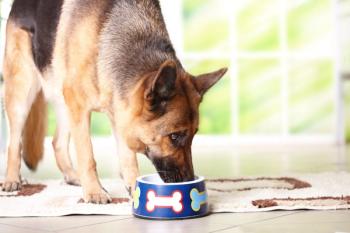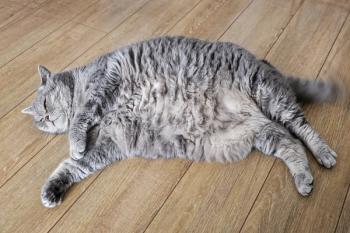
From fat and feeble to lean and lively (sponsored by Iams)
With increasing weight comes increased weight-related disorders, especially osteoarthritis and type 2 diabetes. It's up to veterinarians to reverse this trend and save our patients from suffering needlessly.
Our patients are getting fatter. The latest data from the Association for Pet Obesity Prevention (APOP) reveals over half the nation's dogs and cats are overweight or obese.* With increasing weight comes increased weight-related disorders, especially osteoarthritis and type 2 diabetes. It's up to veterinarians to reverse this trend and save our patients from suffering needlessly. While this task may be daunting, we can succeed. Here are tips on how you can help your clients in the quest to get their pets from fat and feeble to lean and lively.
Ernest E. Ward, Jr., DVM
1) Recognition
The first step in combating obesity is recognition. This is best accomplished by comparing the pet's historical weight trends with its current weight. If you observe that a pet gained 3 pounds during the previous two years, something has changed. Often it's a combination of changes in diet, treats, and lifestyle. Because weight gain is insidious, most pet owners fail to appreciate a few extra pounds over a year or two. "But, doc, it's only 2 pounds since last year." Pet owners need to understand that weight gained slowly is just as deadly as weight gained rapidly. As part of each physical examination report, document the last two weights. If you recognize weight gain early, your chances of preventing morbid obesity are greatly improved. If you wait to speak up until a pet is obese, the client is less likely to feel he or she can change the pet's feeding or exercise habits and is often left wondering, "Why did he just begin talking about my pet's weight now?"
Another important aspect in evaluating overweight pets is recognizing underlying health conditions. I recommend every obese patient undergo complete blood tests, urinalysis, and blood pressure evaluation. Many times we'll discover an emerging problem such as early kidney disease, elevated blood glucose concentrations, or hypertension. If an overweight pet is not displaying outward signs of illness, these abnormal results may convince the owner that change is needed. Further, if a pet has hypothyroidism, a weight loss program is unlikely to be effective. I recommend you create a "weight loss workup" program that includes a physical examination, diagnostic tests, nutritional counseling, and follow-up visits. You can then schedule future check-ins with your trained technicians. If it takes a village to raise a child, it certainly takes a team to shed a pound.
2) Recommendation
Clients need specific recommendations to help their pets lose weight. It's not good enough to simply advise a client to "feed a low-calorie diet" or "exercise more." Weight loss should be addressed as any other medical condition: history, diagnostic tests, treatment, and prognosis. We'd never dream of telling a client to "give an antibiotic" for an infection, yet that is exactly what we are doing if we fail to give specific weight loss recommendations. Our clients need us to specify the daily calories and amount to feed, the brands to choose, and our expectations. Additionally, we need to create detailed exercise regimens. It can be as simple as "walk Scooter for 25 minutes at a brisk pace daily, and try for a 45-minute walk on the weekends."
The best approach to weight loss is one that promotes fat loss while preserving lean muscle mass. As pets lose weight and gain muscle, clients often report an increase in activity levels, enthusiasm, and greeting behaviors and playfulness. I typically recommend a higher-protein, low-calorie formulation as a starting diet for my weight loss patients. I also look for diets that supply essential nutrients that support joint health and mobility such as omega-3 fatty acids and glucosamine/chondroitin.
Weight loss isn't about starvation or deprivation; it's about safe and sustainable lifestyle changes. We're not simply chasing a number on a scale; we're improving overall quality of life. Whatever your weight loss approach, keep in mind the goal is to improve health and prolong life, not just to get skinny. Choose diets that support optimal health and enhance overall wellness while helping lose weight safely. With today's scientifically formulated weight loss diets, we can have it all.
3) Rejuvenation
Obesity steals the joy of living. Weight loss done correctly changes lives. Your clients often forget how rewarding life with a dog or cat can be because the excess weight has slowly sapped the pet's vigor and mobility. Nothing pleases me more than hearing clients exclaim, "He's like a puppy!" or "My cat now jumps on the bed and wants to play!" Not only is the client happy but the pet is rejuvenated. In 20 years of practice, I've found nothing more gratifying than restoring health through weight loss. It's not always easy and may certainly provide some heartache along the way; however, the gains are simply too good to resist. I've also witnessed innumerable pet owners transform their own health as a result of our focus on their pets' weight loss. This is one area of veterinary medicine that truly transcends into "One Medicine."
4) Re-examination
Weight loss isn't a single battle; it's a lifelong war. Follow-up care is essential for success. I typically have patients weighed once a month for the first three months and then every one to three months based on their progress and condition. For clients who don't accept my weight loss recommendations this year, I review it again next year — and the year after that, for as long as I'm their veterinarian. It's important to be persistent, polite, nonjudgmental, and considerate when bringing up the topic of excess weight with clients. I feel it is my professional and ethical obligation to inform clients whenever I see illness, neglect, or ways to improve health, well-being, and comfort. Addressing obesity certainly qualifies as an obligation in my book, and I feel compelled to discuss it whenever appropriate. Many owners simply aren't aware of the problem; they believe their pets are just "big." It's our duty as a profession to speak for our patients that cannot speak for themselves. I believe if my patients could speak, they'd ask for better, more nutritious and wholesome foods. I also think they'd ask for more walks and play time — LOTS more. We must remember why we became veterinarians: to help pets live the best lives they can and to help our clients provide the best homes possible. All it takes is a little time and effort. By making nutrition and weight loss a central part of each appointment, you'll change your patients from fat and feeble to lean and lively.
*See
Dr. Ward is founder of The Association for Pet Obesity Prevention and author of Chow Hounds: Why Our Dogs Are Getting Fatter—A Vet's Plan to Save Their Lives. He has written numerous other veterinary journal articles, texts, and training videos. He is a popular lecturer and is the resident veterinarian for the "Rachael Ray Show" and has been a spokesman for the veterinary profession on Animal Planet, CNN, "NBC Nightly News," "Today," and "Nightline." He owns E3 Management consulting firm and Seaside Animal Care.
Newsletter
From exam room tips to practice management insights, get trusted veterinary news delivered straight to your inbox—subscribe to dvm360.




